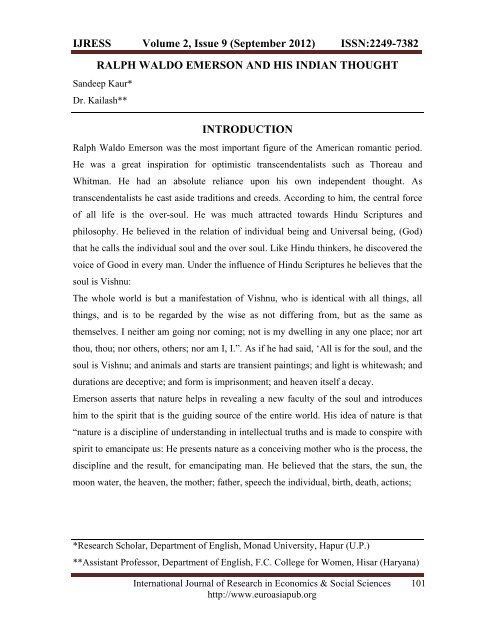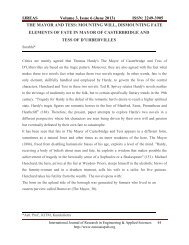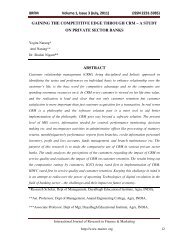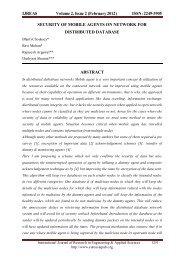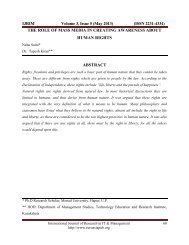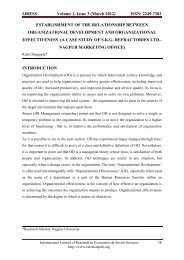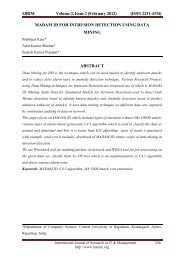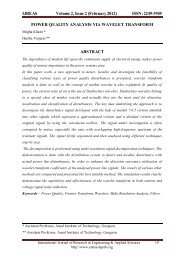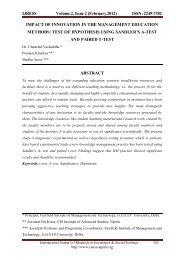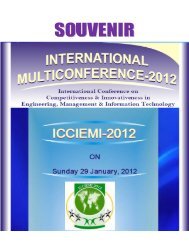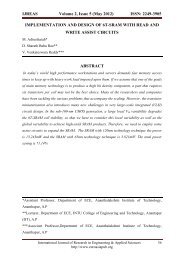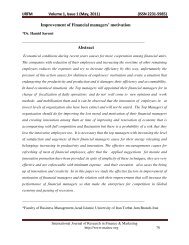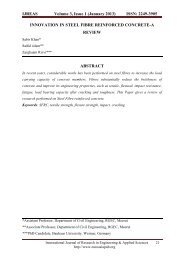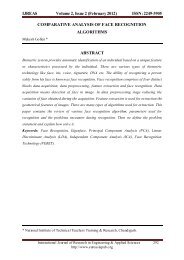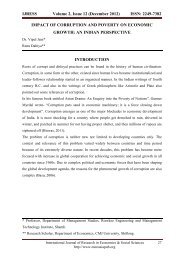ralph waldo emerson and his indian thought - Euroasiapub.org
ralph waldo emerson and his indian thought - Euroasiapub.org
ralph waldo emerson and his indian thought - Euroasiapub.org
You also want an ePaper? Increase the reach of your titles
YUMPU automatically turns print PDFs into web optimized ePapers that Google loves.
IJRESS Volume 2, Issue 9 (September 2012) ISSN:2249-7382RALPH WALDO EMERSON AND HIS INDIAN THOUGHTS<strong>and</strong>eep Kaur*Dr. Kailash**INTRODUCTIONRalph Waldo Emerson was the most important figure of the American romantic period.He was a great inspiration for optimistic transcendentalists such as Thoreau <strong>and</strong>Whitman. He had an absolute reliance upon <strong>his</strong> own independent <strong>thought</strong>. Astranscendentalists he cast aside traditions <strong>and</strong> creeds. According to him, the central forceof all life is the over-soul. He was much attracted towards Hindu Scriptures <strong>and</strong>philosophy. He believed in the relation of individual being <strong>and</strong> Universal being, (God)that he calls the individual soul <strong>and</strong> the over soul. Like Hindu thinkers, he discovered thevoice of Good in every man. Under the influence of Hindu Scriptures he believes that thesoul is Vishnu:The whole world is but a manifestation of Vishnu, who is identical with all things, allthings, <strong>and</strong> is to be regarded by the wise as not differing from, but as the same asthemselves. I neither am going nor coming; not is my dwelling in any one place; nor artthou, thou; nor others, others; nor am I, I.”. As if he had said, ‘All is for the soul, <strong>and</strong> thesoul is Vishnu; <strong>and</strong> animals <strong>and</strong> starts are transient paintings; <strong>and</strong> light is whitewash; <strong>and</strong>durations are deceptive; <strong>and</strong> form is imprisonment; <strong>and</strong> heaven itself a decay.Emerson asserts that nature helps in revealing a new faculty of the soul <strong>and</strong> introduceshim to the spirit that is the guiding source of the entire world. His idea of nature is that“nature is a discipline of underst<strong>and</strong>ing in intellectual truths <strong>and</strong> is made to conspire withspirit to emancipate us: He presents nature as a conceiving mother who is the process, thediscipline <strong>and</strong> the result, for emancipating man. He believed that the stars, the sun, themoon water, the heaven, the mother; father, speech the individual, birth, death, actions;*Research Scholar, Department of English, Monad University, Hapur (U.P.)**Assistant Professor, Department of English, F.C. College for Women, Hisar (Haryana)International Journal of Research in Economics & Social Sciences 101http://www.euroasiapub.<strong>org</strong>
IJRESS Volume 2, Issue 9 (September 2012) ISSN:2249-7382According to Gita, a man, can realize ruth when he rises above prejudices, customs,delusions, appearances, values <strong>and</strong> traditions. He should have no fear of death as it isinevitable. Emerson read the Gita <strong>and</strong> knew the importance of action. He believed that aperson should follow the way of rights actions as right actions leave good impression <strong>and</strong>elevate one’s character while evil action spoilt <strong>his</strong> character. A person cannot from actionas it is also The American Scholar. Emerson says:Action is with the scholar subordinate, but it is essential.Without it, he is not yet man. Without it though can never ripen into truth.Regarding Emerson’s idea of action, Anupam Ratan Shakner Nagar remarks:Emerson here embodies t<strong>his</strong> message of action (Karma) belong the intellectualdeclaration of America Independence in mind. He asserts in “Not God but Only Men”that the people of a country can made a nation great by working hard day <strong>and</strong> night; theycan make it strong by putting in labour <strong>and</strong> it is wrong to believe that the wealth of anation makes a nation great. He advances the same view in Self Reliance when he saysthat as soon as man is one with God, he would not beg. How would then see prayer inaction.According to Emerson, a man should have belief in <strong>his</strong> soul <strong>and</strong> perform all actions bythe grace of God. As it is said by Lord Krishna to Arjuna in the Bhagavadgita that in theexercise of disinterested action, the the intellect is determinate <strong>and</strong> directed singlytowards one ideal, in the same way Emerson’s scholar is the tries to achieve the singularideal of self-realization. In the essay The Poet, Emerson says that he alone knows <strong>and</strong> healone tells as the beholder <strong>and</strong> communicator of ideas. He is able to the secret of theworld <strong>and</strong> the underlying unity in the universe between God, Man <strong>and</strong> Nature. In TheBhagvadgita, it is said that the wise man maintains world order, acts according to thetendencies of <strong>his</strong> own nature <strong>and</strong> never allows himself to be swayed by the two principalenemies of attraction <strong>and</strong> repulsion, similarly Emerson’s poet has the qualities of the wisemen of The Bhagvadgita. Emerson’s idea of self-reliance sounds the idea of discipline<strong>and</strong> self effort spoken about in the Upanishads. In the Upanishads a man is given a veryelevated position as he is not subject to any outward or external force. He is not a puppetin the h<strong>and</strong>s of nature as he can control <strong>his</strong> destiny by <strong>his</strong> virtues. He makes effort toremove the cover of ignorance as Emerson remarks:International Journal of Research in Economics & Social Sciences 102http://www.euroasiapub.<strong>org</strong>
IJRESS Volume 2, Issue 9 (September 2012) ISSN:2249-7382Bravely let him speak the utmost syllable of <strong>his</strong> confession. We but half expressourselves <strong>and</strong> are ashamed of that divine idea which each of us represents. It may besafely trusted as proportionate <strong>and</strong> of good issues, so it is faithfully imparted, but Godwill not have <strong>his</strong> work made manifest by cowards. It needs a divine man to exhibitanything divine. A man is relieved <strong>and</strong> gay when he put <strong>his</strong> heart into work <strong>and</strong> done <strong>his</strong>best; but what he has said or done otherwise shall does not deliver.A man has the power to shape <strong>his</strong> destiny, so he should not afraid of false customs <strong>and</strong>traditional views that are obstacles to <strong>his</strong> free action. A great man has trust in himself <strong>and</strong>adopts the way of uprightness. A self-reliant person has no fear of opposition as he knowsthe force of <strong>his</strong> views <strong>and</strong> actions. Emerson says that the self-reliant man removes falseappearances <strong>and</strong> discovers the very truth.He remarks:Act singly, <strong>and</strong> what you have already done singly will justify you now.Greatness always appeals to the future. If I can be great enough now to do right<strong>and</strong> scorn eyes, I must have done so much right before as to defend me now. Be ithow it will, do right now. Always scorn appearances <strong>and</strong> always may. The forceof character is cumulative. All the foregone days of virtue work their health intot<strong>his</strong>.Emerson knew the relation of man with divine should. In the poem Brahma he says thatGod is in all things <strong>and</strong> motivates the whole world. People who ignore Brahma orbecome oblivious of the existence of Brahma commit a mistake a Emerson says:If the red slayer thinks he slag’sOr if the slain think he is slainThey know not well the subtle waysI keep, <strong>and</strong> pass <strong>and</strong> turn again.Far or f<strong>org</strong>ot to me is near;Shadow <strong>and</strong> sunlight are the same;The vanished gods tome appearAnd one to me is shame ad fame.International Journal of Research in Economics & Social Sciences 103http://www.euroasiapub.<strong>org</strong>
IJRESS Volume 2, Issue 9 (September 2012) ISSN:2249-7382According to him there is unity among all the objects of nature. Like Wordsworth hebelieves that the various object of nature such as the stars, the flowers, the animals, themountains etc. All reflect the one absolute divine principal. The reality is:He is Brahma; he is Vishnu; he is Rudra Indra, Agri, Vayu,Surya, Ch<strong>and</strong>ra <strong>and</strong> all that exists in the three worlds(Mantrapushpam Ganpatyathaashirshopished: 169)His writing is replete with Indian <strong>thought</strong> <strong>and</strong> philosophy. Like Hindu philosophers hebelieves that t<strong>his</strong> world is an illusion. We live in a world of appearance <strong>and</strong> the reality isfar beyond t<strong>his</strong> world of appearances. In the poem Maia says that the world which seemsgay, charming <strong>and</strong> alluring to us, is merely an illusion. As a Hindu yogi, he condemns thematerialistic greed of the people when he says, “Things are in the saddle, <strong>and</strong> ridemankind.” Thus it is clear that Emerson was much influenced by Indian Thought <strong>and</strong>thinkers. As a philosopher <strong>and</strong> a mystical writer, he held that God in moral low <strong>and</strong>believed that man is not to be distinguished from the Divine Essence. Anupam RatanShanker Nagar remarks that Emerson had evolved an unblemished p<strong>and</strong>ect to conduct forman’s purification <strong>and</strong> stressed upon the importance of ethical values in personal life <strong>and</strong>as a transcentalist advocated that the human soul was to be placed above everything else<strong>and</strong> it was only love of nature that could liberate the soul <strong>and</strong> make its union with Godpossible. Clearly Emerson’s optimistic belief lay in the education of both theUnderst<strong>and</strong>ing <strong>and</strong> the Reason.NOTES & REFERENCES1. R. W. Emerson: Essays, New Delhi: Eurasia Publishing House (Pvt.) Ltd. 1965,p. 405.2. R. W. Emerson : The American Scholar in Fisher Samuelsson Reninger Vaid’sAmerican Literature of The Nineteenth Century; New Delhi “ Eurasia PublishingHouse (Pvt.) Ltd., 1984, p. 51.3. Anupam Ratan Shaker Nagar: American Transcendentalism <strong>and</strong> Indian Thought,Delhi: Indian Institute of Language Studies, 20003, p. 57.International Journal of Research in Economics & Social Sciences 104http://www.euroasiapub.<strong>org</strong>
IJRESS Volume 2, Issue 9 (September 2012) ISSN:2249-73824. R. W. Emerson: Self-Reliance in Irwin Edman’s Emerson’s Essays, U.S.A.,Thomas Y.Crowell Co., Apollo, 1961, p. 33.5. Ibid. pp. 42-43.6. Anupam Ratan Shanker Nagar: American Transcendentalism <strong>and</strong> Indian Though,p. 66.International Journal of Research in Economics & Social Sciences 105http://www.euroasiapub.<strong>org</strong>


